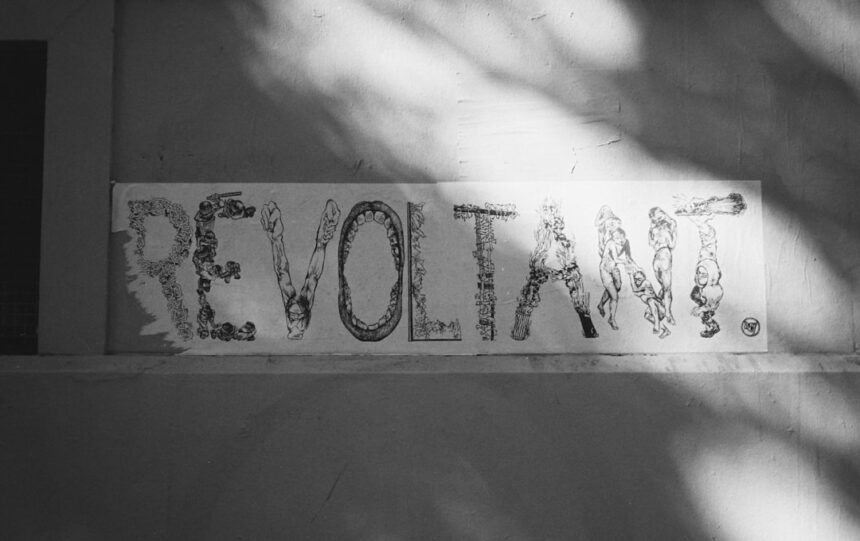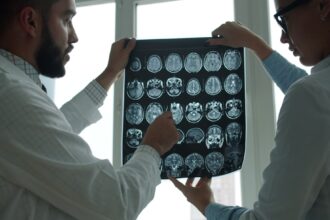Desrealización and despersonalización are psychological phenomena that can significantly affect your perception of reality and self. Desrealización, or derealization, refers to a feeling of detachment from your surroundings, where the world seems unreal or distorted. You might find yourself questioning the authenticity of your environment, as if you are observing life through a foggy lens.
This sensation can be disorienting, making familiar places feel foreign and strange. On the other hand, despersonalización, or depersonalization, involves a sense of disconnection from oneself. You may feel as though you are an outside observer of your thoughts, feelings, or body, leading to a profound sense of alienation from your own identity.
These experiences can be unsettling and often occur in tandem, creating a complex interplay between how you perceive the world and yourself. While they can happen to anyone under extreme stress or fatigue, for some individuals, these sensations become chronic and debilitating. Understanding these phenomena is crucial for recognizing their impact on your mental health and overall well-being.
By exploring the nuances of desrealización and despersonalización, you can begin to navigate the challenges they present and seek appropriate support.
Key Takeaways
- Desrealización and Despersonalización are dissociative disorders characterized by feeling detached from one’s surroundings or oneself.
- Symptoms of Desrealización and Despersonalización include feeling like in a dream, observing oneself from outside the body, and emotional numbness.
- Causes of Desrealización and Despersonalización can be linked to trauma, stress, anxiety, depression, or substance abuse.
- Diagnosis of Desrealización and Despersonalización involves a thorough evaluation of symptoms and ruling out other medical or mental health conditions.
- Desrealización and Despersonalización are often associated with mental health disorders such as anxiety, depression, and PTSD.
Symptoms of Desrealización and Despersonalización
The symptoms of desrealización and despersonalización can vary widely from person to person, but they often share common threads. When experiencing desrealización, you might notice that your surroundings appear dreamlike or surreal. Colors may seem muted, sounds may feel distant, and objects may appear distorted or out of focus.
This altered perception can lead to feelings of confusion and anxiety, as you struggle to reconcile your experiences with reality. You may also find it challenging to engage fully with your environment, leading to a sense of isolation. In contrast, despersonalización manifests as a disconnection from your own thoughts and emotions.
You might feel as though you are watching yourself from a distance, as if you are in a movie rather than living your life. This sensation can lead to a lack of emotional response or a feeling of numbness. You may also experience difficulty in recognizing your own reflection or feel as though your body does not belong to you.
These symptoms can be distressing and may contribute to feelings of helplessness or despair, making it essential to address them with care and understanding.
Causes of Desrealización and Despersonalización

The causes of desrealización and despersonalización are multifaceted and can stem from various factors. One common trigger is acute stress or trauma, which can overwhelm your mind and lead to these dissociative experiences as a coping mechanism. For instance, if you have faced a traumatic event, your brain may resort to detaching from reality as a way to protect itself from emotional pain.
Additionally, anxiety disorders and depression can exacerbate these feelings, creating a cycle that is difficult to break. Substance use is another significant factor that can contribute to desrealización and despersonalización. Certain drugs, particularly hallucinogens or stimulants, can alter your perception and lead to these dissociative states.
Furthermore, sleep deprivation and extreme fatigue can also play a role in triggering these sensations.
How Desrealización and Despersonalización are Diagnosed
| Diagnosis Method | Description |
|---|---|
| Clinical Interview | A mental health professional will ask about symptoms, medical history, and any traumatic experiences. |
| Diagnostic Criteria | Diagnosis is based on specific criteria outlined in the DSM-5 (Diagnostic and Statistical Manual of Mental Disorders). |
| Physical Exam | A physical exam may be conducted to rule out any underlying medical conditions that could be causing symptoms. |
| Psychological Assessment | Psychological tests and assessments may be used to evaluate the severity of symptoms and their impact on daily functioning. |
Diagnosing desrealización and despersonalización typically involves a comprehensive evaluation by a mental health professional. During this process, you will likely be asked about your symptoms, their duration, and any potential triggers you have identified. It is essential to provide detailed information about your experiences so that the clinician can gain a clear understanding of your situation.
They may also inquire about your medical history and any existing mental health conditions that could be contributing to your symptoms. In some cases, standardized assessment tools may be used to evaluate the severity of your symptoms and their impact on your daily life. These assessments help clinicians differentiate between desrealización/despersonalización and other mental health disorders that may present similar symptoms.
A thorough diagnosis is crucial for developing an effective treatment plan tailored to your specific needs.
The Relationship between Desrealización and Despersonalización and Mental Health Disorders
Desrealización and despersonalización are often associated with various mental health disorders, including anxiety disorders, depression, post-traumatic stress disorder (PTSD), and borderline personality disorder (BPD). The relationship between these phenomena and mental health issues is complex; for some individuals, experiencing desrealización or despersonalización may be a symptom of an underlying condition rather than a standalone disorder. For instance, if you struggle with anxiety, the heightened state of arousal may trigger feelings of detachment from reality or self.
Moreover, the presence of these dissociative experiences can exacerbate existing mental health conditions. For example, if you are already dealing with depression, the added layer of feeling disconnected from yourself can intensify feelings of hopelessness or despair. Recognizing this relationship is essential for effective treatment; addressing both the dissociative experiences and any underlying mental health issues can lead to more comprehensive care.
Treatment Options for Desrealización and Despersonalización

Treatment options for desrealización and despersonalización vary depending on the severity of your symptoms and any underlying mental health conditions. One common approach is psychotherapy, particularly cognitive-behavioral therapy (CBT), which focuses on identifying negative thought patterns and developing coping strategies. Through therapy, you can learn techniques to ground yourself in reality and manage feelings of detachment more effectively.
In some cases, medication may be prescribed to help alleviate symptoms associated with anxiety or depression that contribute to desrealización and despersonalización. Antidepressants or anti-anxiety medications can help stabilize your mood and reduce the frequency of dissociative episodes. However, medication should always be considered in conjunction with therapy for optimal results.
Coping Strategies for Desrealización and Despersonalización
In addition to professional treatment, there are several coping strategies you can employ to manage feelings of desrealización and despersonalización in your daily life. Grounding techniques are particularly effective; these methods help anchor you in the present moment by focusing on your senses. For example, you might try describing your surroundings in detail or engaging in deep breathing exercises to reconnect with your body.
By cultivating awareness of your thoughts and emotions without judgment, you can create a sense of acceptance around your experiences. Engaging in physical activities such as yoga or tai chi can further enhance your connection to your body and promote relaxation.
Experimenting with different coping strategies will help you discover what works best for you.
The Impact of Desrealización and Despersonalización on Daily Life
The impact of desrealización and despersonalización on daily life can be profound. You may find it challenging to engage in social situations or perform everyday tasks due to feelings of disconnection from yourself or your surroundings. This detachment can lead to difficulties in maintaining relationships or fulfilling responsibilities at work or school.
As a result, feelings of isolation may intensify, creating a cycle that perpetuates the symptoms. Moreover, the unpredictability of these experiences can contribute to anxiety about when they might occur again. You may start avoiding situations that trigger these feelings, leading to further withdrawal from activities you once enjoyed.
Recognizing the impact on your daily life is crucial for seeking appropriate support; by understanding how desrealización and despersonalización affect you personally, you can take steps toward reclaiming control over your experiences.
Desrealización and Despersonalización in Children and Adolescents
Desrealización and despersonalización are not limited to adults; children and adolescents can also experience these phenomena. However, their manifestations may differ due to developmental factors. Young individuals may struggle to articulate their feelings of detachment or confusion about their identity, leading to misunderstandings or misdiagnoses.
It is essential for parents and caregivers to be attuned to signs of distress in children, such as changes in behavior or mood. In many cases, these experiences in younger individuals may be linked to stressors such as bullying, family issues, or academic pressures. Early intervention is crucial; providing support through therapy or counseling can help children develop coping strategies and address underlying issues before they escalate into more significant mental health concerns.
The Importance of Seeking Professional Help for Desrealización and Despersonalización
Seeking professional help for desrealización and despersonalización is vital for several reasons. First and foremost, mental health professionals possess the expertise needed to accurately diagnose these phenomena and differentiate them from other conditions that may present similar symptoms. By obtaining a proper diagnosis, you can access targeted treatment options that address both the dissociative experiences and any underlying mental health issues.
Additionally, professional support provides a safe space for you to explore your feelings without judgment. A therapist can guide you through the complexities of your experiences while equipping you with coping strategies tailored to your unique situation. Taking this step toward seeking help demonstrates strength; it acknowledges that you deserve support in navigating these challenging experiences.
Resources and Support for Individuals with Desrealización and Despersonalización
There are numerous resources available for individuals experiencing desrealización and despersonalización. Support groups offer a sense of community where you can connect with others who share similar experiences; this connection can be incredibly validating as you navigate the challenges together. Online forums and websites dedicated to mental health provide valuable information about coping strategies, treatment options, and personal stories that resonate with your journey.
Additionally, educational materials such as books or articles written by mental health professionals can deepen your understanding of these phenomena. By arming yourself with knowledge about desrealización and despersonalización, you empower yourself to advocate for your needs effectively. Remember that seeking support is an essential part of the healing process; you do not have to face these challenges alone.
In conclusion, understanding desrealización and despersonalización is crucial for recognizing their impact on mental health and daily life. By exploring symptoms, causes, diagnosis methods, treatment options, coping strategies, and available resources, you equip yourself with the tools needed to navigate these complex experiences effectively. Seeking professional help is an essential step toward reclaiming control over your perception of reality and self-identity; remember that support is available as you embark on this journey toward healing.
La despersonalización y la desrealización son trastornos disociativos que pueden afectar significativamente la percepción de la realidad de una persona. Estos trastornos se caracterizan por una sensación persistente de estar desconectado del propio cuerpo o de la realidad circundante. Para obtener más información sobre estos fenómenos, puedes consultar un artículo relacionado en el sitio web de Unplugged Psych. Este recurso ofrece una visión detallada de cómo estos trastornos pueden manifestarse y las posibles estrategias de tratamiento. Puedes leer más al respecto en este artículo.
LEARN MORE About Unmasking the Mysteries Behind Depersonalization and Derealization
FAQs
What is derealization and depersonalization?
Derealization is a mental health condition where a person feels detached from their surroundings, as if the world around them is unreal. Depersonalization is a similar condition where a person feels detached from themselves, as if they are observing their own actions from outside their body.
What are the symptoms of derealization and depersonalization?
Symptoms of derealization and depersonalization can include feeling like the world is foggy or dreamlike, feeling disconnected from one’s own body or thoughts, and experiencing a sense of unreality or detachment from the environment.
What causes derealization and depersonalization?
Derealization and depersonalization can be caused by a variety of factors, including trauma, stress, anxiety, depression, and certain psychiatric disorders. Substance abuse and certain medications can also trigger these symptoms.
How are derealization and depersonalization treated?
Treatment for derealization and depersonalization may include therapy, medication, and stress-reduction techniques. Cognitive-behavioral therapy (CBT) and mindfulness-based approaches have been found to be effective in managing these symptoms.
Can derealization and depersonalization be cured?
While there is no specific cure for derealization and depersonalization, many people find relief from their symptoms with appropriate treatment. It is important to seek help from a mental health professional if you are experiencing these symptoms.




